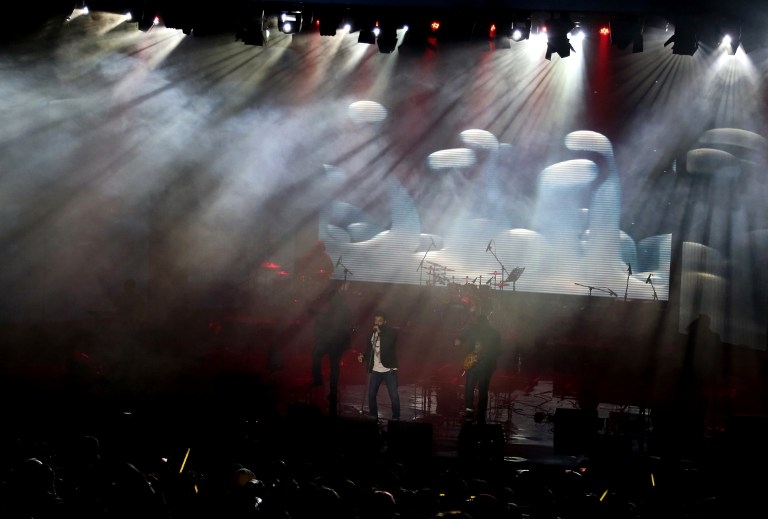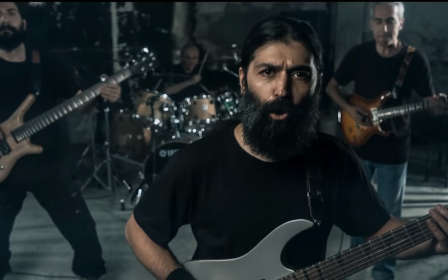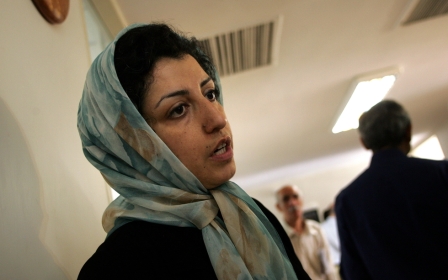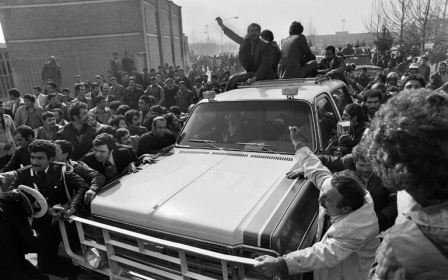Iran's culture wars: Conservatives flex muscles over concerts - and now football

Concerts have emerged as the newest battlefield in Iran, where conservatives have been attempting to show their power and strength against their moderate rivals, led by President Hassan Rouhani.
Ever since the conclusion of the nuclear deal, conservatives have been tightening control over the nation’s cultural and moral values, primarily amid fears that the country will move closer to the West and lose its values to Western influences. In this respect, live concerts have become the target for religious hardliners.
But ever since Rouhani’s election in 2013, conservatives have been gradually increasing their attacks on music concerts despite Rouhani and his team’s resistance. They have pushed for the cancellation of concerts in different cities, enlisting the support of like-minded local authorities and, in many cases, physically attacking the concerts.
In a recent turn of events, the police and judiciary have also intervened to prevent concerts based on what they have vaguely described as “morality issues" - despite the fact that the Culture and Islamic Guidance Ministry has given permission to concert organisers.
Summer tensions
The confrontations between the moderates and the religious hardliners over concerts have intensified since July. In a head-on clash, reacting to an executive order from the Rouhani administration that stated that police have no authority to stop the concerts, the hardliner Seyyed Masoud Jazayeri, the deputy chief of the Joint Armed Forces headquarters, called on the police to confront “moral and cultural maladies … throughout society, namely in regards to concerts".
Then, on 5 August, despite the permission of the Culture and Islamic Guidance Ministry for the concert of the popular Iranian singer Salar Aghili, the judiciary intervened. The prosecutor of the Khorasan Razavi province in the country's northeast announced the concert's cancellation.
“Due to some moral issues in the past performances, until the issue is looked at and a framework is set by the province’s cultural council, all concerts in the province are suspended," he said.
In response the interior minister, Abdolreza Rahmani Fazli, decried the judiciary's suspension of all music concerts in Khorasan Razavi province. In a letter to the conservative Judiciary chief, Ayatollah Sadeq Amoli Larijani, Fazli wrote: “We cannot prejudge the intentions of musicians and base decisions on the possibility that something will go wrong during all concerts. That would not be right.”
Then, on 12 August, Ahmad Alamolhoda, the ultra-conservative and outspoken Friday prayer leader of Mashhad, a representative of the supreme leader in Khorasan Razavi province, said in a Friday sermon, “Mashhad [the seat of the shrine of Imam Reza, the eighth Shia imam] is a pilgrimage destination. … If you want a concert, go and live somewhere else.”
Mashhad is the second-largest city of Iran after the capital, Tehran.
By late August, under pressure from the Students’ Basij Organisation, part of the paramilitary volunteer militia, music concerts were also banned in all of Iran's universities.
'Not your business'
In early October, the fanatic hardliner Ayatollah Mohammad Yazdi, the chairman of the powerful religious organisation Society of Seminary Teachers of Qom, took the confrontation with Rouhani and his team over religious codes to new heights. Qom, the second holy city of Iran, is the site of the shrine of Fatemeh Masumeh, sister of Imam Reza, and is the largest centre for Shia scholarship in the world.
Until last May, Yazdi, an influential cleric, was the head of the Assembly of Experts, the body tasked with the supervision and election of Iran’s supreme leader. As the leading hardliner, he faced an unexpected and perhaps humiliating defeat by losing his seat in the body during the elections in February.
In a press conference on 2 October, he fiercely attacked the minister of culture and Islamic guidance ministry, Ali Jannati, a staunch advocate of moderation and the son of ultra-conservative Ayatollah Ahmad Jannati, chairman of the powerful Guardian Council.
“Mr Minister, it is not your business to say whether [having] music in Qom is appropriate or not. Mind your own business. You have no right to interfere in religious matters," Yazdi said.
He addressed Hassan Rouhani and reminded him that, as a cleric, he should not tolerate events that are perceived as sinful.
In an effort to draw Iran’s leader into the quarrel, addressing Jannati he said: “You say that you are the follower of the supreme leader. He has given permission for certain genres of musical activities but [from the religion point of view] he considers the promotion of music impermissible.”
From music to football
Yazdi also harshly criticised the Rouhani administration for not rescheduling or cancelling the Iran-South Korea qualifying match for the 2018 World Cup. The match coincides with the day of Shia mourning, which commemorates the martyrdom of their third Imam, Hussein, the grandson of Prophet Muhammad.
He asked the government to cancel the event if the holy day would be disrespected. “Can you stop people from cheering after Iran scores a goal [on the day that they are supposed to mourn]?” he asked the authorities. In response to a comment that Iran would pay a price for not playing the game, he responded, “It is better to pay a price than have our sanctities harmed.”
Tension between modernity and conservatism within Iranian society date back to Iran’s Constitutional Revolution of 1905-1911. Enlightened clergy who led the revolution, namely ayatollahs Seyyed Mohammad Tabatabai and Seyyed Abdullah Behbahani, mobilised the masses by demanding an end to absolutism in Iran. As can be seen today, there were clerics who rejected modernity and insisted on a government based on sharia.
The leader of the anti-constitutionalist conservatives was the famous cleric, Sheikh Fazlollah Nouri. Nouri sided with the absolutists in the ensuing civil war and issued the death fatwa against the Constitutionalists. He believed that the parliament (majlis) was not empowered to make laws because laws of society are set by the sharia under Islam. In the aftermath of the Constitutionalists’ victory, Nouri was tried and executed for treason.
Although the essence of this current battle is of an ideological nature, conservatives pursue other objectives too.
In an effort to show their power, they seek to discredit Rouhani who, in his election campaign, had promised more liberties. They want to portray the situation as though nothing has changed under Rouhani, despite his constant defence of the right of young Iranians to express joy and happiness. This, conservatives hope, will disappoint voters in the spring 2017 presidential elections and lead to his defeat.
Strangely enough, Rouhani might be praying that Iran will not defeat Korea in the 11 October qualifying match. Ayatollah Yazdi is right: the country could erupt into cheers on a day that it should mourn. On social media, users have even warned each other not to celebrate on the streets were Iran to beat Korea.
If Iran wins, conservatives will have a powerful pretext to take the issue of disrespecting the religious norms under Rouhani to the next level.
- Shahir Shahidsaless is an Iranian-Canadian political analyst and freelance journalist writing about Iranian domestic and foreign affairs, the Middle East, and the US foreign policy in the region. He is the co-author of Iran and the United States: An Insider’s View on the Failed Past and the Road to Peace. He is a contributor to several websites with focus on the Middle East as well as the Huffington Post. He also regularly writes for BBC Persian. He tweets @SShahisaless.
The views expressed in this article belong to the author and do not necessarily reflect the editorial policy of Middle East Eye.
Photo: Iranian pop singer Sirvan Khosravi performs during the 30th Fajr International Music Festival at the Milad Tower in the capital Tehran on 14 February 2015 (AFP)
New MEE newsletter: Jerusalem Dispatch
Sign up to get the latest insights and analysis on Israel-Palestine, alongside Turkey Unpacked and other MEE newsletters
Middle East Eye delivers independent and unrivalled coverage and analysis of the Middle East, North Africa and beyond. To learn more about republishing this content and the associated fees, please fill out this form. More about MEE can be found here.





